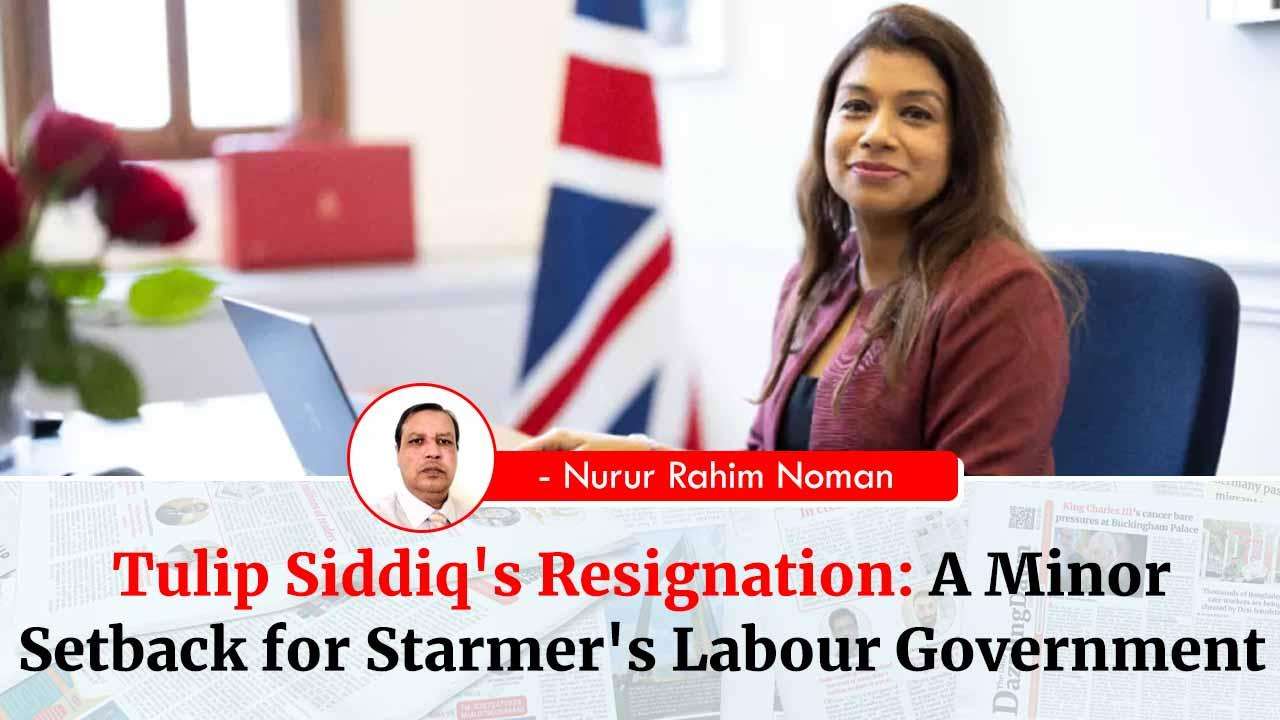The resignation of Tulip Siddiq from her position as a junior Treasury minister is theoretically a political blow for Prime Minister Keir Starmer, but it's far from a major crisis.
Tulip is a relatively unknown politician, not a top-tier figure. The general public is barely familiar with her name, making her politically expendable. In reality, her resignation won't alter government policies.
While this is undoubtedly a difficult personal moment for Tulip, it's a minor issue for the British public, which is natural. Very few ministers leave a lasting impression on the public consciousness. Those whose resignations are memorable (like Geoffrey Howe, Robin Cook, or Sajid Javid) are exceptions.
Most ministerial resignations fade from memory over time, and Tulip Siddiq's will likely follow suit. However, there are important lessons to learn from her departure.
Firstly, Siddiq brought about her own downfall. She should have anticipated questions about her London flat and property matters. As someone aspiring to be a minister, particularly one responsible for fighting corruption, she needed to ensure complete transparency.
The situation becomes more significant considering that during her ministerial tenure, her aunt Sheikh Hasina was the Prime Minister of Bangladesh. Her grandfather was Bangladesh's first president. Her aunt Hasina had pursued increasingly repressive policies over 15 years. She was ousted from power last August, a month after Labour's victory in Britain. This connection made Tulip a target for Sheikh Hasina's opponents.
However, she's not solely responsible for what transpired. Labour campaigned in the 2024 election promising to restore public trust in politics. Political reform was presented as a key pledge to voters. Prime Minister Starmer had previously appointed Sue Gray to prepare the party for government, including thoroughly vetting potential ministers' financial situations and suspicious connections with companies or rulers. Addressing the deep crisis in politics and government should have been Labour's top priority.
Instead, when questions about Siddiq's properties arose in 2022, Labour united to defend her. This became a pattern. Under Starmer and Gray's leadership, Labour was remarkably casual about senior party members' sensitive issues.
Starmer and other senior leaders (like Angela Rayner and Rachel Reeves) accepted gifts of accommodation, clothing, and entertainment items.
While Siddiq's resignation stems from personal mistakes, it reflects broader political problems. Her errors weren't as serious as corruption but rather resulted from carelessness and mismanagement. While ministers could previously survive scandals, today's politics punishes even minor mistakes severely.
On Tuesday, independent adviser on ministerial standards, Laurie Magnus, stated in his report that while Tulip Siddiq couldn't be blamed for her close relationship with Sheikh Hasina, it put her at risk of "complicity in wrongdoing."
Magnus wrote, "It is regrettable that she was not sufficiently alert to the potential reputational risks to herself and the Government." Though mildly stated, this is a serious matter.
Overall, Keir Starmer must share responsibility for this failure. Despite emphasizing credibility and integrity while in opposition, he didn't prioritize these after becoming Prime Minister. He delayed updating the ministerial code of conduct, which should have been done on day one.
While Tulip Siddiq apparently didn't violate the ministerial code, investigator Laurie Magnus didn't completely exonerate her. Rules required ministers to avoid situations where personal interests might conflict with official duties. However, these rules are weak and vague and may need strengthening.
The decline in public trust in politics isn't solely politicians' fault; media has played a role. Mainstream and social media have created an environment where political missteps are amplified, sometimes making mountains out of molehills.
For instance, inflation dropping from 2.6% to 2.5% might be portrayed as a major success despite being a routine change.
Her case demonstrates that conditions for politicians have become more demanding. Simultaneously, it proves that many modern politicians aren't sufficiently skilled to navigate such a rigorous environment.
_4.jpg)
_2.jpg)

_2.jpg)
_3.jpg)



.svg)
